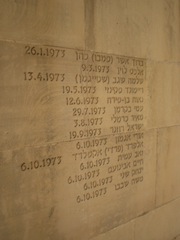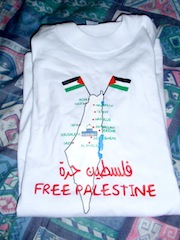The holiest day on the Jewish calendar is called Yom Kippur (“The Day of Atonement”). It is marked by a 25-hour fast and prayer time.
Yom Kippur is a time of deep personal reflection, and it is especially poignant to see this sacred day in Israel, as I did a few years ago.
Standing on the balcony of a high-rise Tel Aviv beach hotel, I watched in fascination as this very Western, free-spirited city shut down. No one operated any kind of vehicle. To see a huge city in a brief moment of stillness was, well, holy.
Every Yom Kippur though, I think about a striking memorial I saw several years ago, north of Tel Aviv, in the heart of the Israeli intelligence community.
A series of giant stone blocks are situated in a sort of maze. At first I didn’t understand what I was looking at, until I realized that chiseled into the stone were the names of Israel’s fallen soldiers, including the date they died.
Turning a corner, I froze upon reading a date. It was identical to many other “dates of death.” Then it hit me.
Yom Kippur, 1973.
6.10.1973
6.10.1973
6.10.1973
On and on it went.
On the eve of Yom Kippur in 1973, Egyptian and Syrian troops and tanks poured across the Sinai and Golan Heights, respectively, in an attempt to conquer Israel.
At home with families, Israel’s active-duty soldiers and reservists alike scrambled to their bases upon hearing the news. Recently retired General Ariel Sharon, on his ranch in the Negev, hurried to the front, as well.
What many of them didn’t know at the time was that in several surrounding Arab countries, Israeli agents had been collecting information. When they realized that a full-scale war was about to erupt, they were found-out and killed. The spy game is one most of us will never know anything about, but those Israelis gave their lives, far from home, and their activities are still shrouded in secrecy.
One wonders what each of the agents thought about in those last moments. They would not know that Israel would absorb initial blows and strikes from the invaders, and on another fateful night a few weeks into the war, Sharon would lead a daring raid across the Suez Canal with a tank division. The raid turned the tide of the war and led to a cease-fire after three weeks.
This year is no different. Yom Kippur is a time of solemn personal reflection. As for me, I’ll reflect on the agents who never came home.


